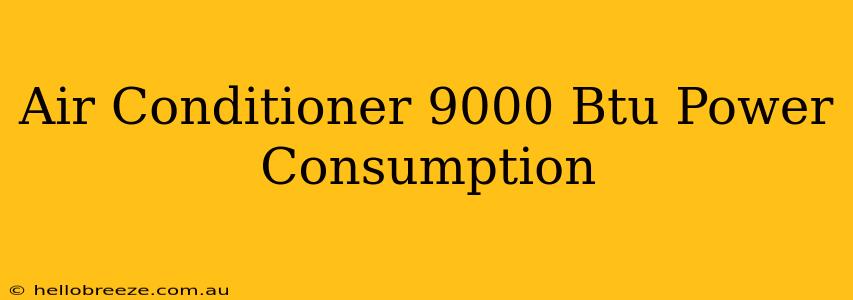Are you considering a 9000 BTU air conditioner but worried about its power consumption? Understanding your AC unit's energy usage is crucial for both your budget and the environment. This comprehensive guide will delve into the power consumption of a typical 9000 BTU air conditioner, helping you make an informed decision.
Understanding BTU and Power Consumption
BTU, or British Thermal Unit, measures the cooling capacity of an air conditioner. A 9000 BTU AC unit is suitable for smaller rooms, typically around 300-400 square feet. However, the actual power consumption isn't directly tied to the BTU rating alone. Several factors influence how much electricity your 9000 BTU AC will use.
Key Factors Affecting Power Consumption:
-
Energy Efficiency Rating (EER): This crucial metric indicates how much cooling you get per watt of electricity consumed. A higher EER means greater energy efficiency and lower operating costs. Look for air conditioners with a high EER rating. The higher the EER, the better.
-
SEER Rating (Seasonal Energy Efficiency Ratio): While EER measures instantaneous efficiency, SEER reflects the efficiency over an entire cooling season. A higher SEER rating signifies better long-term energy savings. Consider this rating when comparing models.
-
Unit Age: Older AC units are generally less energy-efficient than newer models.
-
Usage Habits: Running your AC constantly at a very low temperature will naturally consume more power than using it sparingly or setting it to a moderate temperature.
-
Room Insulation: Poor insulation allows cooled air to escape more quickly, forcing your AC to work harder and consume more energy.
Typical Power Consumption of a 9000 BTU AC Unit
A typical 9000 BTU air conditioner consumes between 800 and 1200 watts at full capacity. This range is broad because of the differences in EER and SEER ratings among models. However, it's important to note that the AC unit doesn't always run at full power. It cycles on and off based on the thermostat setting and the room temperature.
Calculating Your Energy Costs
To estimate your monthly energy cost, you'll need:
- Your AC's wattage: Check the unit's specifications or energy label.
- Your electricity cost per kilowatt-hour (kWh): Check your electricity bill.
- Daily usage hours: Estimate how many hours per day you'll use the AC.
Calculation: (Wattage / 1000) * Daily usage hours * Electricity cost per kWh = Daily cost
Then multiply the daily cost by 30 to get an approximate monthly cost.
Example: A 9000 BTU AC using 1000 watts for 8 hours daily with an electricity cost of $0.15/kWh would cost approximately: (1/1000) * 8 * $0.15 * 30 = $0.36 per day, or roughly $10.80 per month. This is only an estimate and actual costs will vary.
Tips for Reducing Energy Consumption
- Choose an energy-efficient model: Prioritize AC units with high EER and SEER ratings.
- Regular maintenance: Clean or replace filters regularly to ensure optimal performance.
- Proper insulation: Improve your home's insulation to minimize heat gain.
- Use window coverings: Keep direct sunlight out during the hottest parts of the day.
- Smart thermostat: A programmable or smart thermostat can automatically adjust the temperature based on your schedule and optimize energy use.
- Consider your room size: Ensure the BTU rating matches your room's size to avoid overworking the unit.
Conclusion
While the power consumption of a 9000 BTU air conditioner can vary, understanding the factors influencing energy use allows for better choices. By selecting an energy-efficient model and adopting energy-saving practices, you can minimize electricity costs and environmental impact. Remember to always check the specific power consumption details on the air conditioner's label before purchasing.

